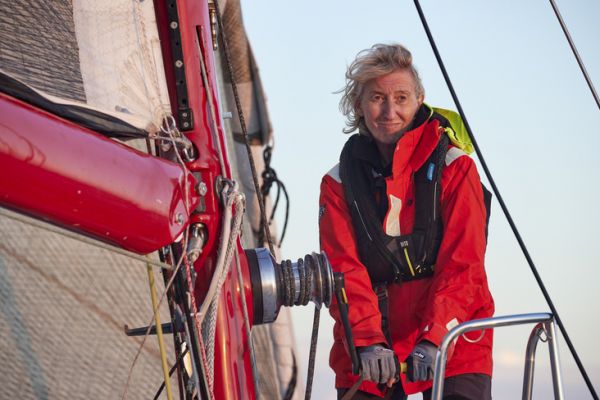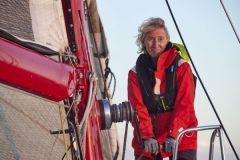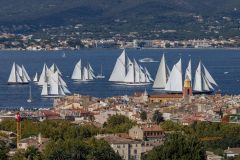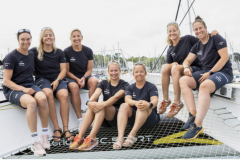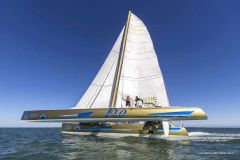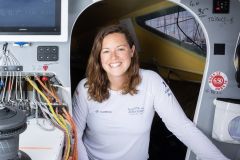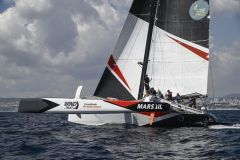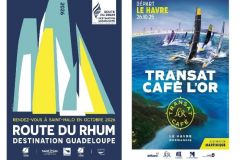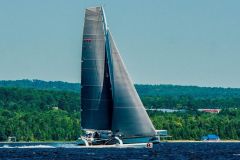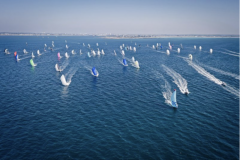Since 2019, Catherine Chabaud has been talking about the sea on a daily basis in the European Parliament. If she occasionally practices it in crew in a personal way, she returns to this Route du Rhum 2022 in the hope of finishing this race that she has never finished. All the more so on the boat that saw her become the first woman to sail around the world single-handed and non-stop.
You stopped ocean racing 20 years ago, why did you return to competition?
It was not at all premeditated when I launched this project a year and a half ago. I never imagined I would return to solo ocean racing. I have continued to sail with a crew, cruising, for pleasure, but I haven't done any solo sailing for 20 years.
I have been talking about the sea every day for years, and the more I talk about it, the less I practice. Maritime issues are not at the heart of the European Parliament's concerns. I am taking advantage of the media resonance of the Route du Rhum to talk about the dangers at sea. It's a jackpot, because I've never talked so much about what I do in the European Parliament. I do much more media than I have in the two years I have been in office. If I didn't also want to go out on my own, I wouldn't have been so motivated and I wouldn't have committed myself.
I'm going to get back to single-handed sailing in a race that I didn't finish in 1998. I especially have the opportunity to do this race, because I already have the boat.
Why did you choose to join the Rhum Mono class?
Very concretely I am unable to go to the IMOCA class, and that was not the objective. We have our boat, with which my husband participated in the last edition in 2018. If he didn't race, would we rent it, sell it? It was hard for me to imagine him going with someone else when I wanted to go.
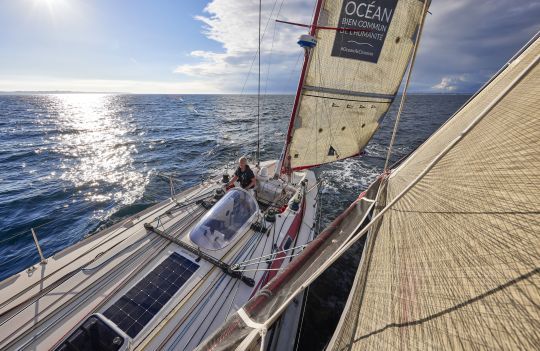
Can you introduce us to your boat, the Cigare Rouge?
I am lucky that my husband had it restored. After his participation 4 years ago, he was still registered for this edition. Feeling very motivated to participate, he let me take his place.
The Cigare Rouge is a 1990 boat built for Jean-Luc Van Den Heede, and designed by Philippe Harlé. She raced in the BOC Challenge, the Vendée Globe and finished second in the 1993 edition. I rented her at the last moment for the 1996-1997 Vendée Globe under the colors of Whirlpool-Europe 2. This is the boat with which I won the title of the first woman to sail around the world single-handed.
It was already not the best performing boat in 1996. The philosophy of VDH and Philippe Harlé was not that of the time, which saw the birth of wider and faster boats in unbridled speeds. I myself had a wider boat built for my second Vendée Globe in 2000-2001.
It has the advantage of being very marine, easy and safe. But it will be physical for me. I celebrate my 60th birthday at the end of November. I want to challenge myself.
In 2005 it was recovered by an association, but was abandoned. It had been afloat in La Rochelle for years, unmoved and completely rotten. I had already thought about recovering it, but I didn't have the motivation. It was finally taken out of the water and left on the quay for several years. My husband, Jean-Marie Patier, amateur sailor, was looking for a boat to do the Route du Rhum 2018 .
It is also thanks to this boat that my husband and I met. VDH had invited us on board when Karen Leibovici arrived, who had raced the Vendée Globe on board.
Four years ago, Jean-Marie had the boat renovated at the V1D2 yard in Caen. On paper, she was redesigned and lightened. There was no need to keep all the bulkheads as she was out of the IMOCA class. The keel has also been changed. Eric Levé from Lombard managed the transformation of the new keel. We took the one from Michel Desjoyeaux's old Foncia. As it was thinner, he designed a daggerboard at the front of the mast. The rigging and the mast are original. We only changed a few parts. It has gained in performance. We also added a mainsail with a horn, which did not exist at the time. The gain is notable. She remains very seaworthy and reliable, but very spartan, but less violent than the current IMOCAs.
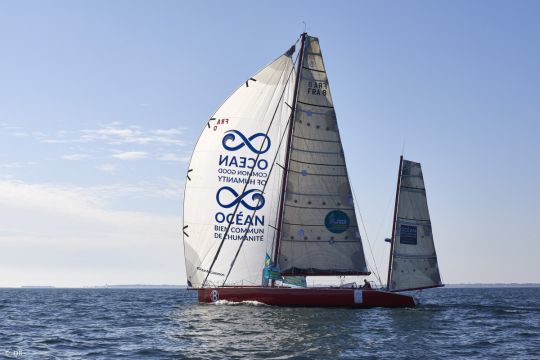
What is your objective in this Route du Rhum?
The sporting objective is to finish the race first. But, in the back of my mind, I know that the boat can make a podium. I will be motivated. In 1998, I raced against the Cigare Rouge. I completed the crossing, but finished out of the race because the masthead broke. I have the frustration of this unfinished race. Besides, finishing it in a race will help me to better carry my message. My challenge for the ocean is about the importance of the issues related to the sea and the preservation of the oceans.
I did my qualifying run in the Drheam Cup and finally won the race! That made me feel better and more confident that I can do something. I can still achieve results! Afterwards, not all the boats in the Mono class of the Route du Rhum were involved in the race, especially the favorite Jean-Pierre Dick. In my class, almost all the sailors have time to sail, while I have very little.
How did you prepare?
Before the Drheam Cup, I ran the ArMen Race with Jean-Marie and some friends. I didn't have time to do my qualification before so I did it in the race. I did a few outings, but very few. I didn't sail as much as I would have liked with my mandate at the European Parliament. My next navigation will be the convoy.
Of course I would be apprehensive if the conditions are very rough at the start. There is bound to be a bit of stress. That was the case before leaving for the Drheam Cup. But I had a lot of fun.
Throughout my sailing career, I have always had good conditions. On the way back from the Drheam Cup, it was gusting to 30 knots downwind and I loved it. I had fun with 25 knots. I'm careful not to get ahead of myself. I want to do my job as a sailor first. I know how to do it.
I've been working a lot on my physique for the past few months, especially by practicing Pilates. I have also been following a diet program. I've been doing swimming and bodybuilding. I was physically tested by the Dhream Cup. The important thing is also to be ready in your head.
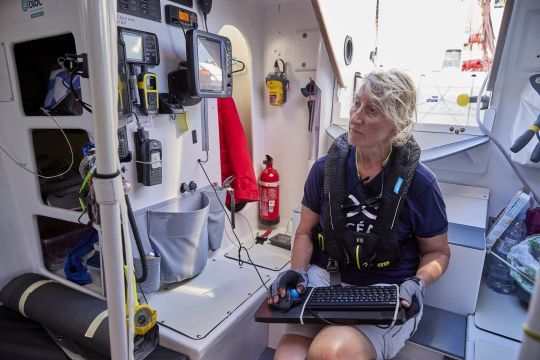
Did you share the experience with your husband who participated 4 years ago on this same boat?
Four years ago, I became a sailor's wife for the first time. I spent three weeks a little tense.
He gives me confidence, he helps me prepare the boat. He shares his experience with me, especially on the maneuvers, because the boat has changed a bit. He will accompany me during the race and that's great.
Is this your last race or could we see you again on other races?
I have continued to sail with a crew on this boat, as I did on the Transquadra, the Fastnet, the Transmancheâeuros¦ And I may continue. This is a one-shot, linked to my European mandate. The MP is committed and wants to find this link with the sea, which I talk about every day, and the maritime issues and the importance of integrating the blue carbon in the climate package.
I have a project to de-carbonize shipping, an amendment on the propulsion of a vessel, derived from ocean racing or the America's Cup. I tried to promote this rigid wing. It is a lot of pedagogy. Europe is interested in the sea through fishing, but the sea is not only the fishing resource. It is impacted by climate change, pollution, resourcesâeuros¦
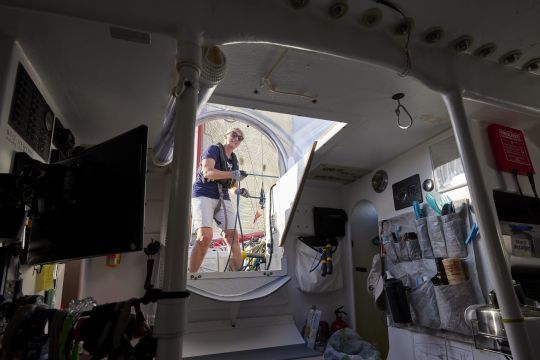
How to reconcile political and ecological commitment with participation in a hypertechnology event?
Making ocean racing and yachting more responsible has been my work for years, after I retired from ocean racing. In particular with my project of a sailboat of the future, close in philosophy to Roland Jourdain's, with biosourced materials and flax fiber.
When in 2018, I launched the call for the ocean to be recognized as a common good of humanity, the IMOCA class and the Route du Rhum were the first to relay the call. There are more and more committed racers, ocean race organizers who are implementing solutions, partners who are also starting to change.
We could be more efficient and go further by getting everyone around the table.
I wanted to organize the Assises de la course au large et développement durable . I participated in several works on sport and sustainable development with the Minister of Sports Chantal Jouanno, notably during France's bid for the Olympic Games.
I am a co-signatory of the recently published "Tribune pour une course au large moins polluante". I have had long discussions with the CSR manager of the Route du Rhum. At any given moment, you have to look in the rear-view mirror. 4 years ago, we were not there.
It would be necessary to gather the he classes, the skippers, the race organizers, the start and finish cities, the sponsors, the institutions of the French Sailing Federation and the clubs and environmental associations around the table. We can really accompany the reflection. We have no choice. It is not decent to do nothing. We have a responsibility. Offshore racing is a formidable field of innovation and experimentation that can benefit from the decarbonization of maritime transport and yachting. It is urgent!
I'm trying to push the Vendée Globe organizers in that direction. The IMOCA class is also developing at this level. Some racers are committed, but not all of them are ready to cut back on performance. They would be much more inclined to do so, if the rules and procedures were the same for everyone.

 /
/ 